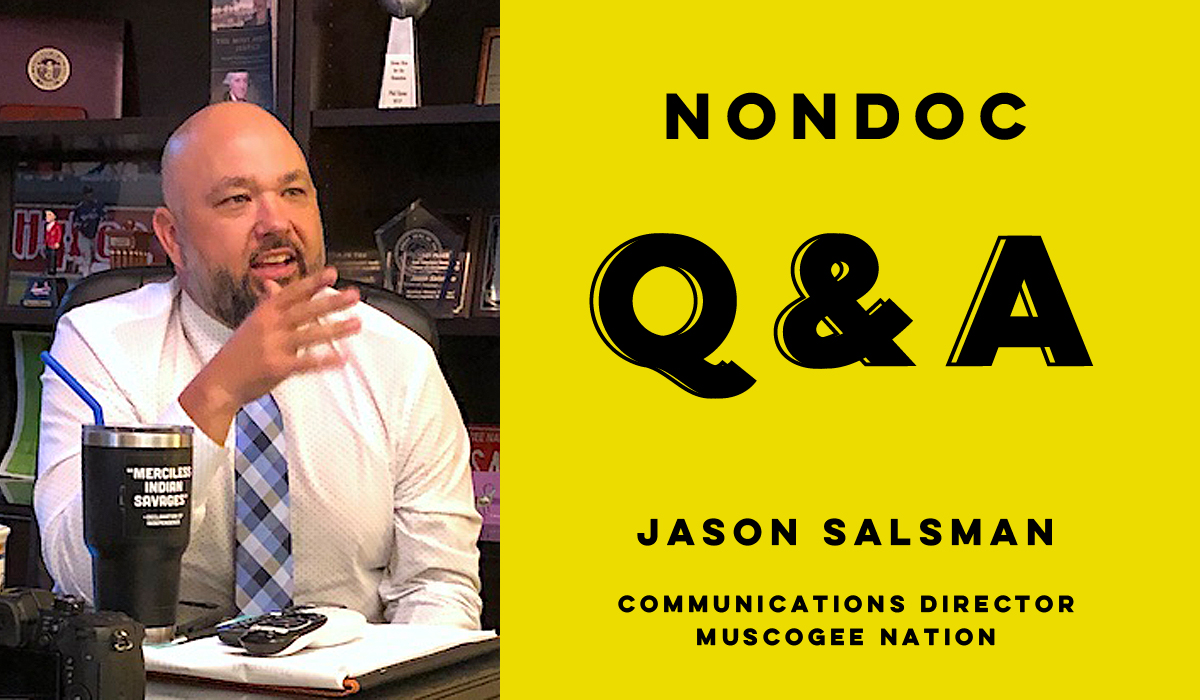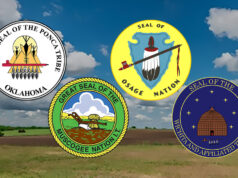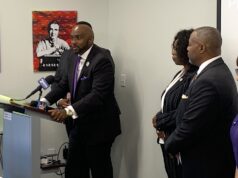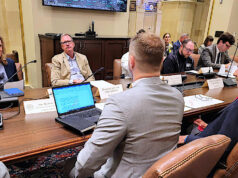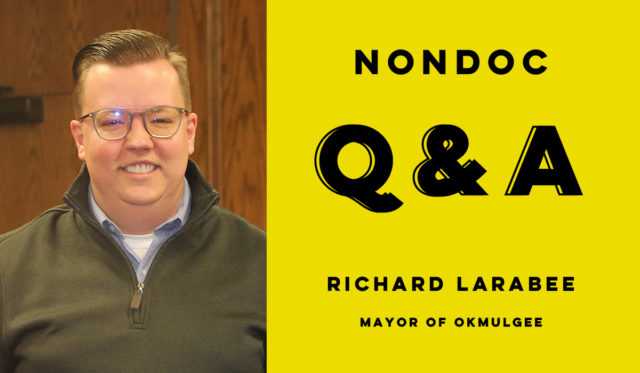
On Wednesday, Aug. 18, Okmulgee Mayor Richard Larabee answered a series of questions about how his eastern Oklahoma city is working with the Muscogee Nation, which had its historic reservation affirmed in July 2020 by the U.S. Supreme Court.
NonDoc participates in the Oklahoma Media Center’s Promised Land effort, which examines how the landmark McGirt v. Oklahoma decision affects both tribal and non-Indigenous residents in the state.
Larabee’s 10-minute interview has been transcribed below and touches on the topics of municipal services, government-to-government negotiations and cross-deputization agreements between non-tribal and tribal law enforcement.
Richard Larabee, 35, was elected to the Okmulgee City Council in 2018 and was appointed vice-mayor in 2019. In 2020, incumbent Okmulgee Mayor Steven Baldridge stepped down, and Larabee automatically assumed the position for the remainder of the term, which ends in 2022.
The following conversation has been edited lightly for clarity and style. This article has been published on the same day as a separate Q&A with Muscogee Nation director of communications Jason Salsman, in which he also answers questions about the cross-deputization issue.
Tres Savage: The first thing I kind of wanted to ask you is what you can say about the status of negotiations about cross-deputization agreements in Okmulgee County? I know you’re Mayor of Okmulgee, so you can’t speak fully for Henryetta. But generally speaking, I think most people would think that there would be some sort of agreement already signed, but it’s not quite there yet. What’s the situation?
Okmulgee Mayor Richard Larabee: So I guess what I’d like to say is our leadership is divided on the issue of cross-deputization. But I am committed to signing a cross-deputization agreement. I feel like I can reasonably say — and I can speak for the (City) Council even — and say that the majority of our council is for signing a cross-deputization agreement. We have two new members of the council, and we’ve had these discussions, and I feel like us as a council are ready. Some of the different leaders and other positions in our county and our city are still divided on the issue and still kind of see it as a negative and carrying liability. I just want to express that I feel like we have nothing but liability without signing on. So I would rather sign one, serve citizens first and sort out the jurisdiction later on.
Savage: What has your conversation been with the chief and other leaders within the Muscogee Nation? There’s some issues — I don’t want to say issues —but there’s some questions on that side of the coin as well, right?
Larabee: Yes, certainly. I feel like, to some extent, I’m not going to pretend to know all the ins and outs of tribal politics. But I feel like from what I can tell — from what I can tell there’s a division in leadership between the council and chief. I feel like Chief (David Hill) and I have both expressed a commitment to get a cross-deputization agreement signed, so that’s what we’re working toward.
Savage: There are broader concerns on the topic of municipal services and property questions that are complicated. Can you elaborate a little bit on some of that discussion?
Larabee: So some of the what we’ll call fees that the city assesses — maybe they’re permitting fees in the sense of business or infrastructure. You know, “Hey, you want to plug into our water lines?” Or, “You’ve got to get your annual business permit.” Some of those that have never been challenged in the past by Muscogee Nation as seen as a tax, now they’re starting to say, “Hey, we see this as a tax. You know, we don’t feel we need to pay these.” And so what I’d like to do is just sit down and discuss that with the chief and second chief and find a way to, again, affirm their sovereignty (and) acknowledge their partnership. Because at the end of the day, I can just speak for myself and say that what they provide to our community, they pay just give us so much support. We’re talking millions of dollars. At the end of the day, the nominal amount in fees really isn’t that important. But I feel like we need to come to the table together and decide what the future of that is going to look like: What services we’re going to offer, what services they’re going to offer. How can we partner together and do it in excellence — just to make sure that all the citizens stay served. That’s really what it’s about.
Savage: Because if there isn’t agreement found, could this go really badly? Could this be — I don’t know I want to say “really badly,” but could this be very contentious?
Larabee: Contentious would be a great word, yeah. And I feel like that’s somewhat fair, now. Either side could escalate and say, you know, the city, of course, has infrastructure that they could say, “Well, you know, if you’re not going to pay, we’ll withhold that from you.” And Muscogee (Nation) would somewhat have the right to challenge: “Well, we still feel like we shouldn’t pay but have access to those services.” What I’d like us to do is just come and sit down at the same table. I feel like me and the chief already do that well, but I’d like to do that even more with the council and say let’s get to the root of the problem here and figure out how best we can work together going forward.
Savage: Two more questions, and the first one takes it back just a second. People have heard that if someone is calling 9-1-1, there is an awkward situation now where questions are being asked: “Are you a tribal citizen? Is the person committing the crime a tribal citizen?” Outline to me what your knowledge of that is directly and then what your concern is about that being the situation.
Larabee: Yeah. So I know that is happening at a dispatch level. I’ve heard those questions being asked. And I’ve gotten those calls from citizens who have expressed concerns about being asked those questions. It’s my desire as mayor, and I don’t have the executive authority to just say, “Well, this is how it has to be done.” We have a council-manager system, so this would take a whole act of our entire council, but it’s my desire as mayor to say, “Hey, we don’t even need to be asking that at the dispatch level. We just need to be providing service.” You know, even if the person calling does happen to be Muscogee citizen or a citizen of any of the five civilized tribes, guess what they still are? They’re still an American citizen. And we need to not withhold services from them of any kind first. I feel like that’s our first priority and ought to be really our only concern — getting out and handling the issue, and then sorting out the jurisdiction later on.
Savage: Last thing. We wrote about the history of the Muscogee Nation Council House and the fact that, at statehood, that property was very, not only important, but valuable. It was taken over by the federal government and then leased back to the new city of Okmulgee. That was well before you were alive, but while you were alive — I think before you were mayor — the Muscogee Nation ended up buying back that property for about, what, $3.2 million or something like that. You’ve said you have thoughts on that money. Where is that money, and do you have thoughts on that money?
Larabee: Yeah. So the historical significance of the Council House is for Muscogee Nation and for our city. I mean, it’s historically significant to both of us. But I do feel like it’s a little bit of a slap in the face that essentially, the [American government] took that Council House from them when we became a state in 1907.
RELATED
A long conversation about the Muscogee Reservation with Jason Salsman by Tres Savage & Joe Tomlinson
The city, you know, had control of that for decades and decades and then sold it back to Muscogee Nation. How can we sell them something back that was theirs originally? You know what I mean? So those monies are held in a trust. We call it our “community trust,” and they’re spent on property improvement projects. That’s how we’ve outlined that those dollars need to be spent.
So it’s my commitment on any dollar that we spend out of that community trust while I’m in leadership, I really want to see how that dollar can be a partner with Muscogee Nation because — personally, just my own sentiment on it — is it’s their money. It was their property, and it should have never been handled the way that it was. Obviously, there were multiple leaders involved in that, and that spanned the last 100-plus years. So it’s not any one person’s fault. But I would just like to commit as a leader to saying how we spend that money, and we need to look at that when we spend those dollars. (We should) figure out how we can best serve Muscogee Nation just like they continue to serve us.
Follow @NonDocMedia on:
Savage: Wonderful. Any other thoughts or comments you’d like to make on the topic?
Larabee: Well, I’ll say this, because we were talking before. I am not aware of an administration at a Muscogee Nation level or an administration at the City of Okmulgee level that has worked as well together as I feel like myself, Chief (David Hill) and Second Chief (Del Beaver) do currently. We made a commitment. We eat breakfast together nearly every week. The only time we cancel out is if one of us has to be out of town.
As we look towards economic prospects, we’re looking at those together. In the past, we’ve worked in a vacuum, right? We bring a business into the city, we talk about incentives for that business at a city level. Now when we look at these prospects, what we’re doing is we’re bringing chief and second chief into that conversation. They are bringing us into the conversation if the lead starts with them, and we’re saying how can we make incentives for this business on both sides on it? So I feel like, If that outlook continues, if there’s a commitment by whoever holds my position after me and whoever holds their positions after chief and second chief are gone, if they’ll continue down that, there’s a bright future for Okmulgee and a huge partnership that can be reached. I’m excited that we’ve made that commitment, at least for the time being.











